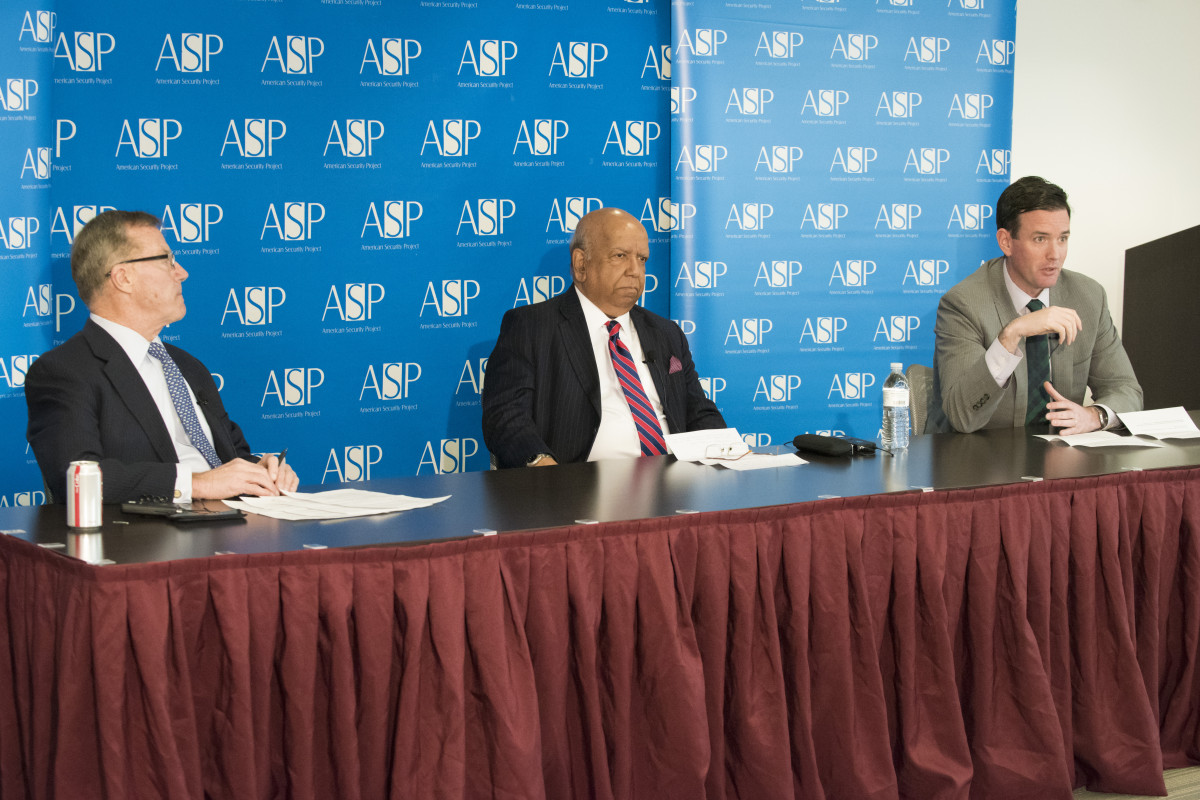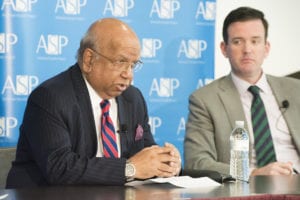
Event Recap: Migration and Security in the Age of Climate Change
Podcast: Play in new window | Download
Subscribe: Apple Podcasts | RSS
Major General Muniruzzaman, American Security Project’s CEO General Cheney, and COO Andrew Holland came together to discuss the real-time crisis of the internationally unrecognized climate-related displaced population at an ASP event Migration and Security in the Age of Climate Change.
Sea level rise, extreme weather events and disasters, erratic drought and flooding, and water scarcity is expected to displace millions. As a result, there will be permanent, internal and external migration. Farm communities that depend on the fertility of their crops are hit the hardest by extreme drought and flooding caused by climate change. Out of desperation, these “climate refugees” migrate into the cities for food and work which has triggered food riots and instability for nations who are not prepared to handle the influx.
Refugee’s fleeing from persecution and conflict are granted certain rights under international law: right to asylum, right of return, right of nonrefoulement, and the right of family reunification. Unfortunately, no legally-binding term exists for refugees impacted by climate; therefore they are not afforded any rights. The underlying complexities that come from climate change impacts make defining whether a migrant is a “climate refugee” very difficult. Andrew Holland and General Muniruzzaman contended that there should be an international standard to recognize climate refugees. They suggested that international law should extend climate refugees the same status as political refugees or create a new regime that addresses this specifically.
 General Muniruzzaman opened his comments by outlining that “climate change is the future of migration”; and is currently impacting national and global security. Muniruzzaman is especially concerned with the effects that sea level rise will have on our mega-cities which contain 56% of the global population and are located within 37 miles of the coast. Flooding of these cities will induce the largest climate migration; possibly in history. Mumbai, New York, London, and many other cities that are central hubs for global communication and financial transactions are located on these coastlines. A shut-down of these cities for as little as seven days will send global shockwaves. Ports to which countries depend on for trade, food, and security provisions will be directly affected as well. Areas currently dealing with climate displacement include northern Africa, Syria, and the Pacific islands—which are expected to disappear by 2050 completely. Within his own country of Bangladesh, one meter of sea-level rise in the southern region will put 20% of the country underwater. As a result, at least twenty-five million people will be displaced. There is not enough territory for the state to absorb this transition; therefore many of the population will be forced to migrate externally. This is concerning because the world has not been able to accommodate the few thousand Syrian refugees fleeing to Europe. Therefore, the fate of millions of people attempting to relocate is unknown.
General Muniruzzaman opened his comments by outlining that “climate change is the future of migration”; and is currently impacting national and global security. Muniruzzaman is especially concerned with the effects that sea level rise will have on our mega-cities which contain 56% of the global population and are located within 37 miles of the coast. Flooding of these cities will induce the largest climate migration; possibly in history. Mumbai, New York, London, and many other cities that are central hubs for global communication and financial transactions are located on these coastlines. A shut-down of these cities for as little as seven days will send global shockwaves. Ports to which countries depend on for trade, food, and security provisions will be directly affected as well. Areas currently dealing with climate displacement include northern Africa, Syria, and the Pacific islands—which are expected to disappear by 2050 completely. Within his own country of Bangladesh, one meter of sea-level rise in the southern region will put 20% of the country underwater. As a result, at least twenty-five million people will be displaced. There is not enough territory for the state to absorb this transition; therefore many of the population will be forced to migrate externally. This is concerning because the world has not been able to accommodate the few thousand Syrian refugees fleeing to Europe. Therefore, the fate of millions of people attempting to relocate is unknown.
The lag of action to address these climate concerns are derived from the denial that resonates within regional and international powers, “The failure to recognize climate refugees is due to the fact that no nation wants to take on the obligation that comes with an internationally accepted status for these migrants.” He warned that the cost of this denial will be substantial if nations do not accept the reality that exponential climate-related migration is inevitable. States must educate themselves of the realities of climate impacts on human security instead of building divisions; only then will we find solutions to this crisis.
 American Security Project’s General Cheney expanded on the importance of preparing for the security risks that come with these inevitable climate impacts and stressed impacts that sea level rise and extreme weather events will have on military bases. Norfolk and other low-lying coastal bases will either have to relocate or construct reinforcing infrastructure (e.g., seawalls) to remain operational. Like Muniruzzaman, he is deeply concerned with the consequences of not acknowledging and finding solutions for climate refugees promptly.
American Security Project’s General Cheney expanded on the importance of preparing for the security risks that come with these inevitable climate impacts and stressed impacts that sea level rise and extreme weather events will have on military bases. Norfolk and other low-lying coastal bases will either have to relocate or construct reinforcing infrastructure (e.g., seawalls) to remain operational. Like Muniruzzaman, he is deeply concerned with the consequences of not acknowledging and finding solutions for climate refugees promptly.
In conclusion, transboundary climate migration is inevitable; and require global and domestic solutions. Globally we must recognize these climate-related migrants and raise awareness. Nationally, governments must accept and understand the problem so that they can find a practical solution.






